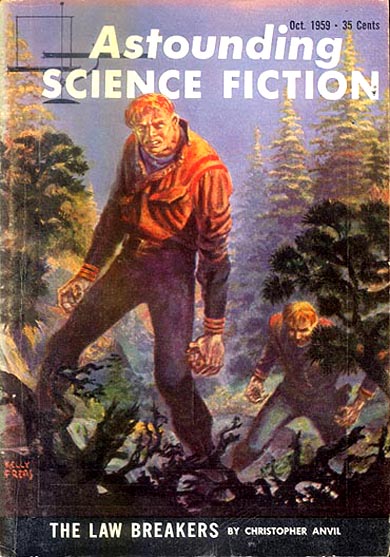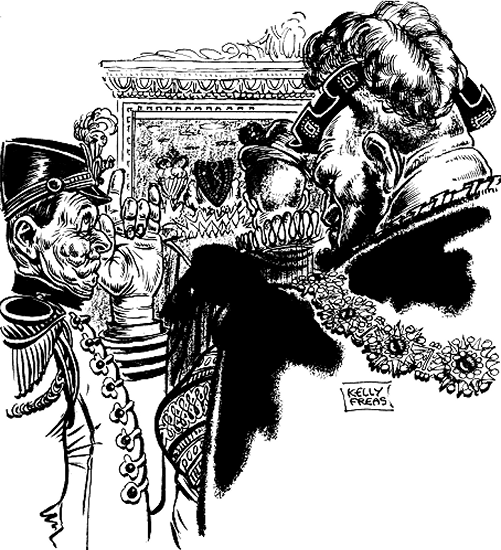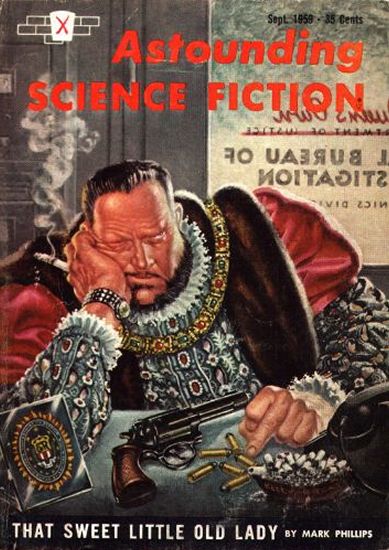
I had planned on breaking up the rest of this month’s (October 1959) Astounding into two parts, but seeing how there are only four pieces of fiction, albeit long ones, I’ve decided to give it all to you in one blow.
Chris Anvil continues to put out the most mediocre stuff imaginable. These are the stories I’d expect to see in Imagination, if “Madge” were still around. The Law-Breakers is the cover story for this issue, and it really is barely worth the space it takes. Two invaders from a race of extremely humanoid aliens attempt to infiltrate the Earth using sophisticated invisibility technology. All of their predecessors have failed on these missions, so the stakes are high. As it turns out, the Terrans are ready for the invaders, trailing them wearing cloaking fields of their own.
Once captured, the invaders are offered a deal—become citizens and their sentence will be reduced from felony sabotage to a host of petty misdemeanors. Along the way, we get some fatuous smugness about how Earth is better than the aliens because it is a planet of multiple competing civilizations rather than a single, united race. It took me three sittings to finish the story, which is saying something for a 30-page story.
Story #2 is even worse: The Unspecialist, by unknown Murray F. Yaco, features a pilot and co-pilot of a small scout ship accompanied on their mission of reconnaissance by a “Bean Brain,” a seemingly useless fellow who, nevertheless, contributes valuable expertise in a particular pinch. The gotcha of the story (a disappointing cliché of science fiction that I thought had died out) is learning the former profession of the unspecialist. Dull, dull, dull.
I was thus rather pleasantly surprised by the third story, Dodkin’s Job, by the old hand, Jack Vance. Somehow, I have a soft spot for dystopian stories with highly regimented societies. Not so much the predestined occupation stories, like Asimov’s Profession, but more the totalitarian tales where people are pigeonholed into horizontal layers of privilege and are constantly trying to climb out.
In this one, Luke is a 40-year old born with ample opportunities, but due to his nonconformist nature, he finds his career a sordid succession of demotions until he finds himself a Level D Flunky assigned to clean sewers. When a new labor directive is passed down to return his shovel to the central office every day, thus wasting three hours of his own time, Luke decides to petition the authorities. Up the ladder he goes, to the very top, and then back down to the prestige-less clerk levels whence the impetus for the decision came. There, he finds the true secret of bureaucracy—that data is power, and it is the presenter of data who really has the power, not the decision-makers who can only make decisions based on the data presented.
It’s a story that kept me up past my bed-time, and, as a person who presents data for a living, a very instructive piece, to be sure!
That leaves us with Part 2 of That Sweet Little Old Lady, by Mark Phillips aka Randall Garrett. As you know, I’m rather predisposed against Mr. Garrett, but I did stick it out through both installments, this tale of telepaths, espionage, FBI agents, and renaissance costumery.
In short, there is an information leak somewhere in America, and it’s up to Agent Malone to find it. Along the way, he teams up with a host of insane telepaths, all of whom are non-functioning with the exception of one who believes herself to be an immortal Queen Elizabeth I. She insists that her entourage dress appropriately, and I now understand why Randy dressed up as Henry VIII for Wondercon—he was really dressing up as Agent Malone (or Malone was designed to look like Randy playing Henry VIII).

Anyway, it’s a flippantly written who-dunnit. It’s not offensive, and I was able to finish it in a reasonable amount of time, but it was the literary equivalent of Saltines—bland and not particularly satisfying. Also, I’m getting rather tired of Kelly Freas—how many wrinkles does an illustrated person need, anyway?
Thus ends another 2.5 star Astounding. This makes the biggest spread between magazines I've seen in a month–compare to 3.5 for Galaxy, 4.5 for F&SF.
That’s that for magazines this month, though I'll do an Astounding Analytical Laboratory stop press in a couple of days. Next month, we’ve got another Astounding, F&SF, and IF. Also, a host of anticipated space shots, probably a movie or two, and a new science fiction/fantasy/horror anthology debuting in about a week: The Twilight Zone.
See you soon!
—
P.S. Galactic Journey is now a proud member of a constellation of interesting columns. While you're waiting for me to publish my next article, why not give one of them a read!
(Confused? Click here for an explanation as to what's really going on)
This entry was originally posted at Dreamwidth, where it has comments. Please comment here or there.


